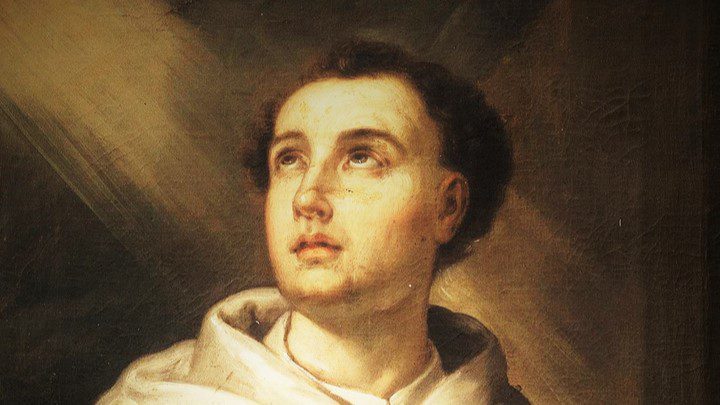January 28
ST. THOMAS AQUINAS, PRIEST AND DOCTOR OF THE CHURCH
The Angelic Doctor teaches us how we should seek the Lord: with our intelligence, with the help of profound spiritual formation, with a life of love and prayer (cf John Paul II, Discourse at the Pontifical University of Saint Thomas Aquinas, 17 November 1979).”
EXCERPT FROM In Conversation with God, vol. VI.
Have a nice day and God bless! Fr. Rolly A., priest of Opus Dei.
+++READING STARTS HERE. CAPS MINE.+++
THE CROSS EXEMPLIFIES EVERY VIRTUE
From a conference by Saint Thomas Aquinas, priest
Why did the Son of God have to suffer for us? There was a great need, and it can be considered in a twofold way: in the first place, as a remedy for sin, and secondly, as an example of how to act.
It is a REMEDY, for, in the face of all the evils which we incur on account of our sins, we have found relief through the passion of Christ. Yet, it is no less an example, FOR THE PASSION OF CHRIST COMPLETELY SUFFICES TO FASHION OUR LIVES. Whoever wishes to live perfectly should do nothing but disdain what Christ disdained on the cross and desire what he desired, for THE CROSS EXEMPLIFIES EVERY VIRTUE.
If you seek the example of LOVE: Greater love than this no man has, than to lay down his life for his friends. Such a man was Christ on the cross. And if he gave his life for us, then it should not be difficult to bear whatever hardships arise for his sake.
If you seek PATIENCE, you will find no better example than the cross. Great patience occurs in two ways: either when one patiently suffers much, or when one suffers things which one is able to avoid and yet does not avoid. Christ endured much on the cross, and did so patiently, because when he suffered he did not threaten; he was led like a sheep to the slaughter and he did not open his mouth. Therefore Christ’s patience on the cross was great. In patience let us run for the prize set before us, looking upon Jesus, the author and perfecter of our faith who, for the joy set before him, bore his cross and despised the shame.
If you seek an example of HUMILITY, look upon the crucified one, for God wished to be judged by Pontius Pilate and to die.
If you seek an example of OBEDIENCE, follow him who became obedient to the Father even unto death. For just as by the DISOBEDIENCE of one man, namely, Adam, many were made sinners, so by the obedience of one man, many were made righteous.
If you seek AN EXAMPLE OF DESPISING EARTHLY THINGS, follow him who is the King of kings and the Lord of lords, in whom are hidden all the treasures of wisdom and knowledge. Upon the cross he was stripped, mocked, spat upon, struck, crowned with thorns, and given only vinegar and gall to drink.
Do not be attached, therefore, to clothing and riches, because they divided my garments among themselves. Nor to honors, for he experienced harsh words and scourgings. Nor to greatness of rank, for weaving a crown of thorns they placed it on my head. Nor to anything delightful, for in my thirst they gave me vinegar to drink.
Stay updated: subscribe by email for free TO OUR NEW WEBSITE www.catholicsstrivingforholiness.org (PUT YOUR EMAIL IN THE SUBSCRIBE WIDGET).
We are also in www.fb.com/Catholicsstrivingforholiness. Kindly help more people in their Christian life by liking our page and inviting your family, friends and relatives to do so as well. Thanks in advance and God bless you and your loved ones! Fr. Rolly Arjonillo
